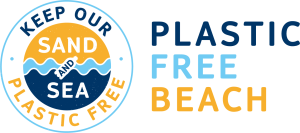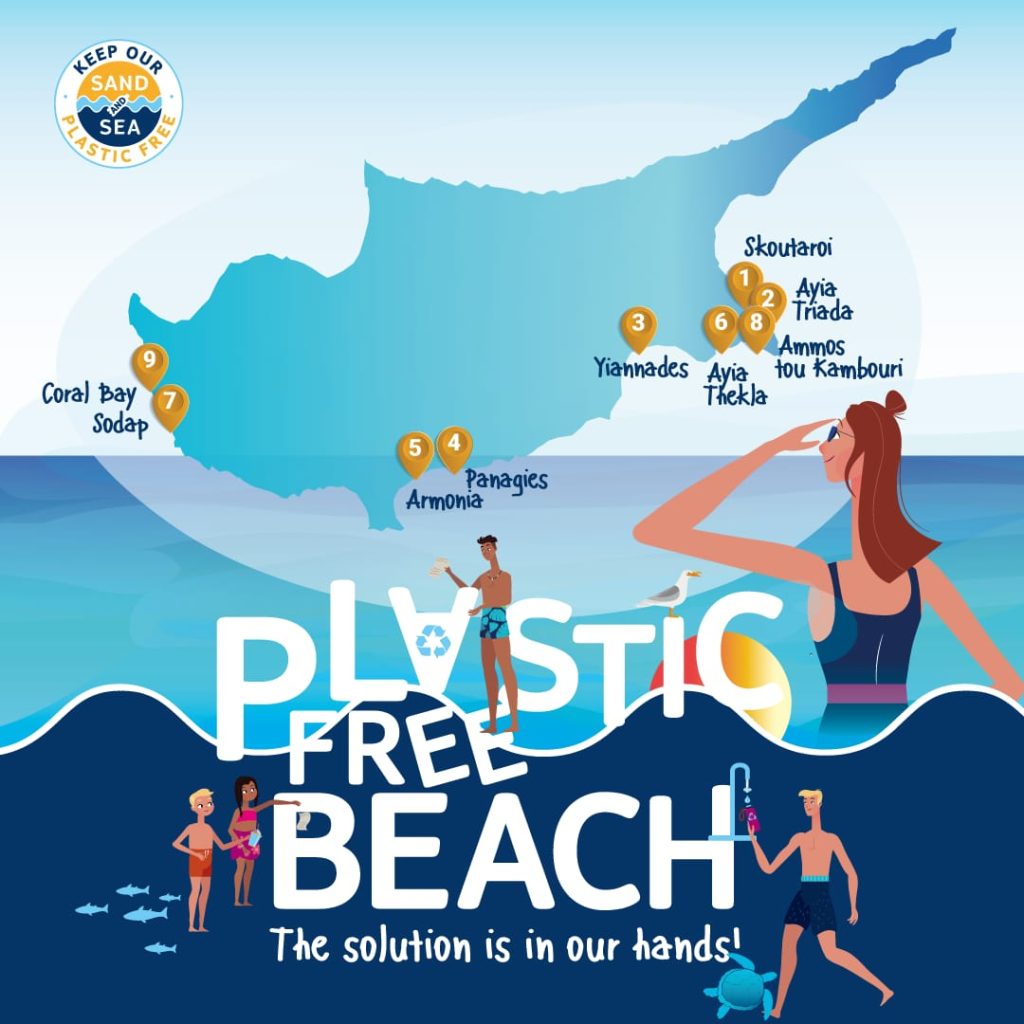
– a beach that inspires its visitors to act for the reduction of plastic pollution.
The “Plastic Free Beach” idea is to organise a beach that encourages and facilitates its visitors to avoid the use of single-use plastic during their stay at the beach. The aim is to sensitize the visitors of the beach to reduce the use of single-use plastic by being a part of the solution and not the problem. This concept is an idea of the “Keep Our Sand and Sea Plastic Free, Destination Zero Plastic in Cyprus” Project. The Project aims to bring together tourists, tourism businesses and residents to cut consumption of single-use plastic in coastal regions so that less plastic ends up in the sea reducing plastic pollution. It is an initiative of the TUI Care Foundation in partnership with the Cyprus Sustainable Tourism Initiative (CSTI).

The 1st “Plastic Free Beach” was implemented at Ayia Triada Beach, Paralimni and officially launched on 4/08/2021.
The 2nd “Plastic Free Beach” was implemented at Skoutaroi Beach, Paralimni and officially launched on 1/06/2022.
The 3rd “Plastic Free Beach” was implemented at Yiannades Beach, Voroklini and officially launched on 20/03/2023.
The 4th “Plastic Free Beach” was implemented at Panagies Beach, Pyrgos Limassol and officially launched on 21/03/2023.
The 5th “Plastic Free Beach” was implemented at Armonia Beach, Agios Tychonas, Limassol and officially launched on 16/09/23.
The 6th “Plastic Free Beach” was implemented at Ayia Thekla Beach, Sotira, Famagusta and officially launched on 17/12/2023.
The 7th “Plastic Free Beach” was implemented at SODAP Beach, Pafos and officially launched on 23/05/2024.
The 8th “Plastic Free Beach” was implemented at Ammos tou Kambouri Beach, Agia Napa and officially launched on 24/05/2024.
The 9th “Plastic Free Beach” was implemented at Coral Bay Beach, Municipality of Akamas and officially launched on 09/05/2025.
The most important tasks for a successful implementation of the concept of a “Plastic Free Beach” is the engagement of all the stakeholders of the area. It is mandatory that all the stakeholders such as the Municipality/Community, the owners of a nearby restaurants, cafés, hotels etc. be involved in the implementation of this initiative and their collaboration is essential. For example, it is not possible to encourage the visitors of the beach to bring their reusable cup for their drinks if the nearby café declines the use of the reusable cup.
Facilities that can be introduced at a “Plastic Free Beach”:
Below, there is a list of actions that can be implemented on a “Plastic Free Beach”. The mandatory actions are marked with (M).
- Offer cold, filtered and free water (M): Installation of a refillable water station at the beach so the public can have access to free, cold and filtered water.
- Cigarette butts (M): The Top plastic waste item collected from beaches globally. Provide paper or reusable plastic ashtrays to the smokers or attach an astray to all umbrellas. Another idea is to organise a smoking area at the beach and encourage the smokers to use this specific area. This area should have shade and ideally not be too close to the sunbeds.
- Refillable water bottle: Encourage the guests to bring their refillable bottle for water and use the refillable water station. The nearby businesses can also sell refillable water bottles instead of selling plastic bottles.
- Reusable cup: Engage all the guests to bring their reusable cups for take away drinks. The nearby businesses can give a discount to the guests that bring their reusable cups.
- Reusable take away box: The business can have reusable take away boxes and charge a deposit fee to the users. When the users bring the boxes back to the business, the deposit will be returned. The takeaway boxes can have the business logo on it.
- Alternative to plastic straws: Encourage guests to avoid the use of straws. In many cases the straw is not necessary for drinks. If the guest needs a straw, they can use alternatives to plastic.
- Plastic toys: Encourage parents and children to avoid using plastic toys on the beach or if they use them make sure that they collect them before leaving the beach. Also, there is the possibility of installing a collection point for all the plastic toys left behind which can be used by the next young beach visitors.
- Artwork (M): Install an artwork to raise awareness on the beach with an explanatory info sign. This artwork can be created from rubbish collected from beach and underwater clean ups.
- Educational activities for kids: Organise educational activity events for kids to inform and sensitise them about plastic pollution and the need to use alternatives.
- Information signs (M): For the implementation of all the above ideas it is necessary to inform the visitors of the beach with the installation of informative/engaging signs on the beach.
- Sensitise the local businesses (M): Organise information events for the staff of the nearby businesses to be aware of the implementation of the “Plastic Free Beach” and take action for the reduction of plastic pollution.
- Awareness campaigns (M): Organise at least 2 beach clean ups and awareness events per year on each “Plastic Free Beach”. In order to measure the outcome of the initiatives on the “Plastic Free Beach” the European protocol for beach clean ups must be followed.
The “Keep Our Sand and Sea Plastic Free, Destination Zero Plastic in Cyprus” Project wants to contribute to the overall changing of behaviour of locals and tourists alike. The aim is two-fold:
-
- The reduction of the use of single-use plastic in every aspect of our lives.
- The change of our culture regarding the consumption of plastic in our daily lives in order to achieve the reduction of plastic pollution of our seas.
- The reduction of the use of single-use plastic in every aspect of our lives.
